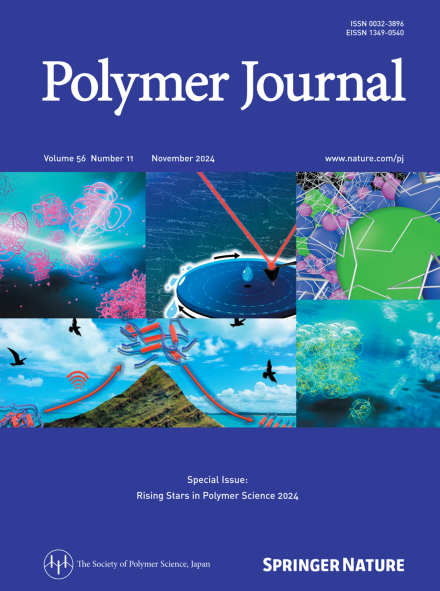不同酰基链长和残余羟基含量甘蔗渣单酯在土壤中的降解行为及力学性质
IF 2.3
4区 化学
Q3 POLYMER SCIENCE
引用次数: 0
摘要
需要具有生物降解性和适当机械性能的生物质塑料来取代来自化石燃料的持久性合成塑料。木质纤维素农业废弃物,如甘蔗渣,是有前途的可再生资源,当其丰富的羟基(OH)被酰基取代时,特别是那些具有较长链长的酰基,可以提供更好的热加工性。然而,过度的化学改性会损害木质纤维素固有的生物降解性,并削弱所得到的塑料。本研究将酰基优化为癸醇(De, C=10)基团,该基团对降低全取代甘蔗渣单酯的熔体流动温度,提高热成型性最为有效。以甘蔗渣总OH含量为3 ~ 0.4摩尔当量的癸酸乙烯酯(VDe)为原料,合成了甘蔗渣癸酸乙烯酯(BagDe)系列,并考察了其热力学性能和土壤降解性。当VDe含量大于0.6当量时,合成的BagDe可以热压成型,而残余OH含量的增加提高了吸水率、降解率和抗拉强度。这些发现表明了木质纤维素基生物可降解塑料的潜在应用,如农业地膜。本文章由计算机程序翻译,如有差异,请以英文原文为准。

Degradation behavior in soil and mechanical properties of bagasse monoesters with different acyl chain lengths and residual hydroxy contents
Biomass plastics with biodegradability and suitable mechanical performance are needed to replace persistent synthetic plastics derived from fossil fuels. Lignocellulosic agricultural wastes, such as sugarcane bagasse, are promising renewable resources that offer better thermal processability when their abundant hydroxy (OH) groups are substituted with acyl groups, particularly those with longer chain lengths. However, excessive chemical modification can impair the inherent biodegradability of lignocellulose and weaken the resulting plastics. In this study, the acyl group was optimized to a decanoyl (De, C=10) group, which was the most effective in lowering the melt flow temperature of the fully substituted bagasse monoester to improve thermal moldability. The bagasse decanoate (BagDe) series were synthesized using different amounts of vinyl decanoate (VDe) ranging from 3 to 0.4 molar equivalents to the total OH content of bagasse, and their thermal/mechanical properties and degradability in soil were examined. BagDe synthesized with more than 0.6 equivalents of VDe could be hot-press molded, while the increased residual OH content improved the water uptake, degradation rate, and tensile strength. These findings indicate the potential applications of lignocellulose-based biodegradable plastics, such as agricultural mulch films.
求助全文
通过发布文献求助,成功后即可免费获取论文全文。
去求助
来源期刊

Polymer Journal
化学-高分子科学
CiteScore
5.60
自引率
7.10%
发文量
131
审稿时长
2.5 months
期刊介绍:
Polymer Journal promotes research from all aspects of polymer science from anywhere in the world and aims to provide an integrated platform for scientific communication that assists the advancement of polymer science and related fields. The journal publishes Original Articles, Notes, Short Communications and Reviews.
Subject areas and topics of particular interest within the journal''s scope include, but are not limited to, those listed below:
Polymer synthesis and reactions
Polymer structures
Physical properties of polymers
Polymer surface and interfaces
Functional polymers
Supramolecular polymers
Self-assembled materials
Biopolymers and bio-related polymer materials
Polymer engineering.
 求助内容:
求助内容: 应助结果提醒方式:
应助结果提醒方式:


